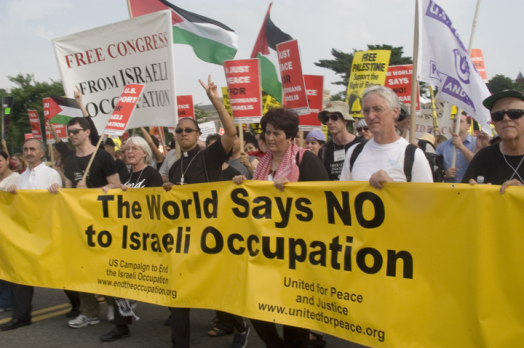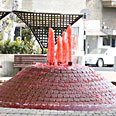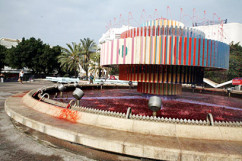June 2007, hopeful movement towards justice
As the British academics UCU boycott bites (coming after UK union boycott calls from doctors, architects as well the National Union of Journalists in the last twelve weeks alone), this month has also notably seen historic worldwide rallies calling for justice and an end to the military occupation of Palestine by Israel, including in Washington and Palestine and Israel itself.
Washington Rally: click on thumbnails for full size. Images from photographer Diane Greene Lent
It may well be that June 2007 is a hinge of history in this long running injustice, as we see unprecedented scrutiny, historical correctives and reflections on the occupation, significance of the 1967 war and the Israeli attack on the USS Liberty.
Masaryk Square (L) and Dizzengof fountains in Tel Aviv, where protesters added red paint to represent “the blood of the thousands who were killed and the tens of thousands who were injured throughout the long years of occupation”. The leaflet they distributed also invited Tel Aviv residents to dip their hands in the reddened water and “realize that these hands, which appear clean, are also stained with the blood of the occupied and the oppressed.”
I first posted this determinedly upbeat entry a few hours ago unaware of the most recent escalations of US- and Israeli government facilitated factional violence in the OPT, about which I have written previously (see Divide and Conquer; to which I’ve not much to add right now). We need to be reminded of successes to sustain hope and keep us going, too. Drying up in despair doesn’t help anybody much.
It is true one can not be too Pollyanna-ish — Israel continues its illegal settlements and its divide and rule starvation of the Palestinians. In the US, the neocons have arguably been at their apogee and the Israel Lobby assured of an AIPAC-beholden Presidency and Congress.
But the disastrous occupation quagmire of Iraq and the craven betrayal of the Congressional Democrats on the critical issues of US withdrawal and war de-funding has at least further exposed the charade to more people, as reflected in various polls. The scurrilous attacks on Norman Finkelstein has also laid bare the desperation of the Israel Lobby and revealed the extraordinary lengths to which such members as Alan Dershowitz are driven to go to smear and slander challengers.
In some of the good news: the EU has resumed direct aid, and many prominent international figures have been moved to speak up for Palestine and argue for sanctions. South African Ronnie Kasrils and British doctor Colin Green, for example, cogently make the case for boycotting apartheid and supporting justice (excerpts after the ‘More’ break).
In Israel, some of the children of the high-profile Zionist founders of the state of Israel have turned their backs on this legacy, including the grandson of the right-wing PM Menachem Begin, 32 year-old Avinadav Begin, seen regularly protesting at the West Bank side of the Apartheid Wall over the past few years.
In a recent post entitled Scions of Zion Turn Against Their Fathers, Richard Silverstein has noted how three prominent progeny of Zionist pioneer Askenazi right wing establishment families have disavowed their political inheritance and spurned the zionist zeal of their parentage. In addition to Menachem Begin’s grandson, an anarchist activist peace protester at Bi’ilin regularly for the past two and a half years as mentioned, we also have no less than the Irgun-steeped Ehud Olmert’s daughter Dana attending a rally during the Lebanon war.
As well, Avrum Burg, a former Knesset speaker, Shimon Peres protégé, and Israel Agency director has just had his bombshell book released, Defeating Hitler, and left the country to take up French citizenship. While the book is not yet available in English, it is by all accounts a trenchant and hard-hitting critique of contemporary Israel and the whole Zionist enterprise.
In a review and interview with his friend Burg, Ari Shavit writes: “The Israel of Defeating Hitler is a very harsh place. Brutal and imperialist, confrontational and insular. A shallow place, thuggish, lacking spiritual inspiration.”
In the interview he asks Burg: Does this mean that you no longer find the notion of a Jewish state acceptable? to which Burg replies:
“It can’t work anymore. To define the State of Israel as a Jewish state is the key to its end. A Jewish state is explosive. It’s dynamite.” He is favour of abrogating the Law of Return, compares Israel to Germany and urges Israelis to obtain foreign passports (worth reading in full: Leaving the Zionist Ghetto + Part Two)
 For Burg then, a progressive zionism does not seem possible and he has broken ranks. Progressive Zionists do have within their ranks genuine peacemakers in the Uri Avnery tradition (see also ‘The Other Zionists’ documentary) who may yet effect some reform from within.
For Burg then, a progressive zionism does not seem possible and he has broken ranks. Progressive Zionists do have within their ranks genuine peacemakers in the Uri Avnery tradition (see also ‘The Other Zionists’ documentary) who may yet effect some reform from within.
In the US, individuals who I don’t think would mind this characterisation include Richard Silverstein. Richard has recently come under some attack from vitriolic, rabid cyber-bullies and experienced some smear himself. As with Finkelstein, I offer my sympathies, and can not help but notice how much more shrill these voices are becoming. Our political positions certainly diverge, but that does not preclude seeking and finding common ground — I recognize Richard as a sincere bridge-builder in the I-P conflict who genuinely does want peace and justice. Whether it can be done within zionism or not remains to be seen.
Ronnie Kasrils address to the South African Parliament less than a week ago summarises the conflict well, and concludes:
“Let us unanimously extend our solidarity and support to the forty-two members of the Palestinian Legislative Council, including the Speakers of the West Bank and Gaza, who together with ten Ministers have been summarily detained without trial, most for nearly a year, by the Israeli security forces. This is a shocking illustration of Israel’s disrespect for parliamentary democracy, the law and basic human rights so reminiscent of what we suffered under apartheid. We call for their immediate and unconditional release; and all prisoners held by both sides.
In support of these demands let us join with the people of our country, and the international community, in the solidarity marches, rallies and demonstrations this week, the 40th anniversary of Israel’s unjust occupation. And we make it clear to our Jewish community, these peaceful and disciplined actions, are aimed solely at that government. The struggle for freedom and justice is against a system and not a people.
Let me conclude with the words of President Mandela, who declared in 1998 during the visit to South Africa by Chairman Yasser Arafat: “We know too well that our freedom is incomplete without the freedom of the Palestinians.”
And Colin Green lays out the case for boycotts:
Since starting academic work in the occupied territories during the first intifada in 1987, I have travelled a trajectory of hope to near despair. From a naïve optimism for a just and lasting peace for Israelis and Palestinians 20 years ago, in which I welcomed with great enthusiasm Israeli postgraduates to my institute for specialist surgical training and research, I now refuse any collaboration with any Israeli university or research institution because of the violations of human rights I have seen over the past two decades and in which they collude.
As in the past, I still work with Israeli humanitarian organisations genuinely seeking justice for the Palestinians. I am no longer prepared to stand idly by and not come out publicly against the level of oppression I have seen, including ethnic cleansing and the establishment of a brutal apartheid regime, a terrible injustice against the indigenous population of the occupied territories.
What experiences can have brought about this revolution in attitude? In 1987, I was buoyed by the gentle, non-bigoted, optimistic attitude toward the Israelis of virtually all the Palestinians I met.
Even in the face of the violence and killings in the first intifada carried out by the Israeli Occupation Forces (IOF), they believed that reason and good will would prevail and the international community would come to their rescue. I was amazed how tolerant academics were toward their oppressors. None of them did, or could have, forecast the descent into hell which the Palestinians would endure in the next two decades, nor believe that a people who themselves had known such a hell could possibly descend to the level of barbarity we are now witnessing.
…
The list of [Israeli] restrictions is too long to detail. Examples include: the closure of Birzeit University for four years; refusal of entry to that and all other universities for teaching faculty and students on the whim of heavily armed Israeli teenagers in uniform at checkpoints; refusal to allow passage to medical students to their teaching hospitals; raiding of campuses in the middle of freezing winter nights forcing women undergraduates to stand for five or six hours outside in their nightdresses simply to humiliate them while their dormitories were ransacked; refusal to allow doctors to attend their clinics and teach students on the ludicrous claim that their ID cards (valid for the previous 15 years) were fake; refusal to allow UK academics entry to Ben-Gurion airport and forced return on the grounds they were engaged in subversive acts simply coming to be medical teachers.
Then has been the refusal to allow a final-year student to attend his graduation ceremony and to add to his humiliation and torment by being forced at gunpoint to stand and watch the proceedings from only 400 metres away; refusal or long delays in granting exit permits for Palestinian research workers and teachers travelling abroad to conferences; the threat that if they travel overseas (especially if they have a Jerusalem ID) they may not be allowed back into their own homes again; endless restrictions on travel within the occupied territories so that attendance at lectures or important exams are a daily nightmare; the forced return of Gaza students “illegally” studying in the West Bank, some after seven years of separation from their families and in their final year of medical training; the deliberate shooting at school buses carrying six to 10-year-old children by Israeli snipers; recently, the kidnapping and imprisonment without charge of five senior university lecturers in Nablus; the killing of a young female medical student by CN gas. All of this I have witnessed at first hand.
My outrage is not fuelled by bigotry or racism, but by what I have seen. I am consumed with anger that I have not come out of the closet many years ago to protest publicly the wickedness I knew full well was going on in the occupied territories.
Without inquiring my opinion about China and Tibet, or Russia and Chechnya, or Darfur and Sudan, critics demand to know why I feel so strongly about Israel. First, it is what I know first hand, initially as sympathiser now bitter critic; second, because Israel does not even pretend to be part of the Orient, but is the one lingering outpost of European colonialism that participates in Euro song contests, football cups, preferential trade agreements, and EU and NATO research grants, and, therefore, has to carry the same human rights obligations and responsibilities we Europeans recently demanded of Serbia; and most important, the Levant has long been historically, and even more urgently so now, the epicentre of world conflict.
Just as I campaigned for boycotts against apartheid in South Africa many years ago, now I shall do so against Israeli apartheid. I strongly support the motion carried by a two third majority by my trade union, the UCU. Now, at last, we can actually have a robust, honest and fearless debate and engage with all shades of opinion on the conflict.












Recent Comments